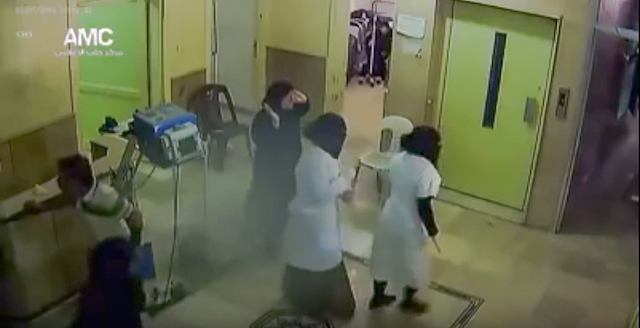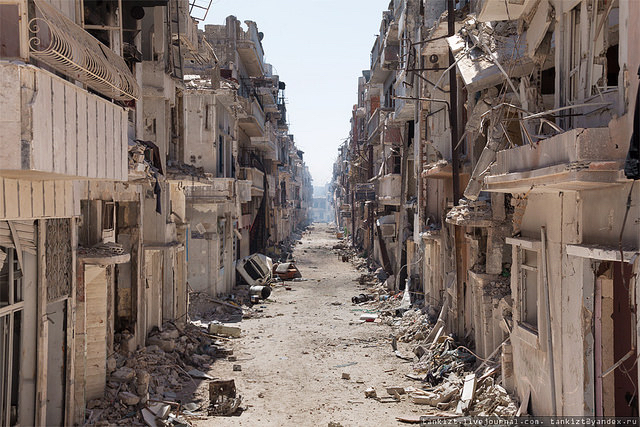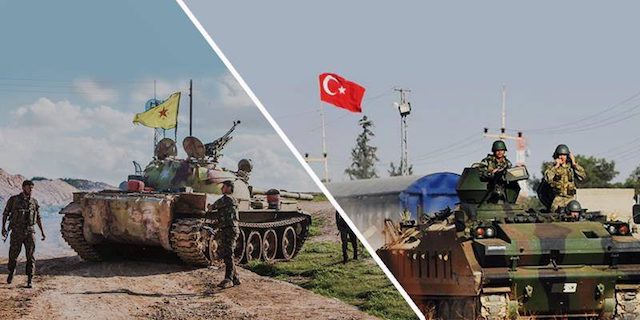Amid the blame game of warring parties in Aleppo, the healthcare system in Syria’s largest city is dying a slow and excruciating death.
Al-Razi Hospital, in the western al-Mohafaza neighborhood of Aleppo city, is the main government-run public hospital for the entire Aleppo governorate. As the first responder hospital in Syria’s largest and most violent city, it treats hundreds of wounded civilians every day.
For four years, Aleppo has been divided between the government-controlled western area and the eastern part held by a coalition of opposition groups. Between June 2012 and late 2013, the state-run Aleppo Health Directorate and Aleppo University moved their major affiliated healthcare facilities bordering the rebel-controlled neighborhoods to al-Razi. Today, al-Razi is one of only three major hospitals – along with Aleppo University Hospital and Ibn-Rushd Hospital – left to serve the 1.5 million residents of government-controlled Aleppo.
Residents, at least one-third of which have been displaced from the rebels’ side of town, are dependent on state hospitals for medical services like vaccinations, insulin shots and dialysis. In the first quarter of 2016, according to figures from the Syrian government, Aleppo’s healthcare facilities provided residents of government-controlled areas with 280,000 discrete medical services – everything from major war-related surgeries to diabetes insulin treatments. Out of that total, al-Razi contributed 100,000 services.
Given the significance of these three hospitals for the city dwellers, physicians in the government-held part of town fear that any attack on any of the major medical facilities would leave the city’s healthcare in tatters. As violence and clashes continue in Aleppo, hospitals, clinics and other healthcare facilities have been increasingly caught in the crossfire.
Hospitals Under Attack From All Sides
For months now, both the Syrian and Russian air forces have been carrying out airstrikes against healthcare facilities in rebel-held neighborhoods. In early July, forces allied with the Syrian government effectively besieged eastern Aleppo, cutting off the only supply route into the rebel-held area. Since then, residents have said that airstrikes have been almost daily occurrences.
https://www.youtube.com/watch?v=q4jRDLHX_64
In the week of July 23, Syrian and Russian forces targeted at least six medical facilities in Aleppo, including three hospitals on the eastern side in 24 hours, in what global nonprofit Physicians for Human Rights (PHR) called “the worst week for attacks on medical facilities in that region since the Syrian conflict began in 2011.”
Rebel and extremist group attacks on western Aleppo have increased significantly as well over the last 100 days. Various factions have been accused of launching everything from mortar bombs to “hell cannon” and “Hamim” 200 kg improvised rockets into civilian areas, including healthcare facilities.
In response to the Syrian-Russian campaign, opposition attacks have become more retaliatory in nature since April 21, when the Saudi-backed opposition High Negotiations Committee (HNC) withdrew from the United Nations-sponsored Syria peace talks in Geneva, accusing the Syrian government of breaking the nationwide cease-fire brokered earlier in February.
A day after the official breakdown of the Geneva talks, the Aleppo Conquest Coalition – a joint opposition military operation room that includes both extremist and moderate militias like Jabhat al-Nusra, Jabhat Shamiyeh, Ahrar al-Sham Islamic movement, Nur al-Din al-Zenki Battalions, the 16th Division and the Badr Martyrs Battalion – shelled the western part of the city with hundreds of gas canisters and Hamim rockets, leaving at least six civilians dead and 48 injured, according to numbers from al-Razi.
Over the next three weeks, doctors, patients and healthcare workers in government-controlled areas came under rebel fire. It is impossible to tell the exact number of casualties – local, international and foreign media report death tolls from 17 to 57 – but it’s safe to say that dozens were killed, including hospital patients and at least one doctor.
On April 25, Dr. Walid Kablawi, the head of the department of gynecology at Aleppo University Hospital, was killed by a mortar bomb that hit al-Zahra neighborhood. According to interviews conducted by phone with government physicians, more than 33 healthcare workers were killed, and 8 others injured, between March and May of this year. The following day, bombshells from rebel-held Bani-Zaid hit the Ibn-Rushd Hospital, causing material damage to its premises and medical equipment.
On April 27, rebel groups accused the Syrian government and its Russian allies of attacks on al-Quds Hospital, the main pediatric care center in rebel-held neighborhoods, that left 55 people dead.
One day later, fighters affiliated with Jabhat al-Nusra in Bustan al-Qasr launched rocket attacks that landed in the vicinity of al-Razi hospital, leaving four people dead and 38 others wounded.
On May 3, a rebel “Hamim” rocket targeted the al-Dhabeet Maternity Hospital in al-Muhafaza neighborhood and left three pregnant women dead and more than 17 injured. Later that month, al-Razi hospital tightened its security and visitors scanning measures after an ISIS suicide bombing attack on the Jableh hospital in Latakia province that killed 40 patients, a doctor and two nurses.
On June 1, groups affiliated with the Aleppo Conquest Coalition also targeted al-Ihsan Charity Association medical center in the al-Mocambo neighborhood. More than 45 people were injured, most of them women and children, as well as three volunteers from the center. (The World Health Organization has since confirmed to Syria Deeply that they have helped rehabilitate the facility to return to its normal functions.)
Disappearing Physicians
As violence escalates, and more violence is taking the lives of healthcare workers across the divided city, more doctors are leaving. As of this year, the number of medical doctors in government-held Aleppo fell to 850, less than half the number of doctors before the war, according to a phone interview with a government source who asked to remain anonymous for security reasons.
World Health Organization (WHO) representative Elizabeth Hoff told Syria Deeply that roughly 95 percent of Aleppo’s doctors from both sides of the city have either fled, been detained or killed since the beginning of the crisis.
Several healthcare workers also pointed out that a large proportion of the remaining physicians in western Aleppo are doctors who graduated during the war and those who are still completing their medical residencies. Physicians speak optimistically about the high proportion of younger doctors, as it signals that the city is still giving birth to new generations of health workers. Nonetheless, the numbers indicate a severe lack in specialists, especially surgeons. For instance, the general surgery department at al-Razi hospital consists of 10 specialist surgeons and 12 resident surgeons. The department of vascular surgery – a critical specialty for wartime hospitals – consists of only one vascular surgeon and three residents.
Most physicians have left government-controlled Aleppo because of economic pressures. The electricity outages, which reached 23 hours a day in 2015, forced more than a third of private hospitals and 60 percent of private clinics in government-controlled Aleppo to close. Most of them were not able to cover the increasing prices of fuel and private generators. As a result of the economic sanctions imposed by the U.S and the E.U. in 2011, private practitioners have not been able to buy replacement parts for their medical equipment from those sources. Instead, they have to buy them from India or China, as these countries are not part of the sanctions. Furthermore, inflation, increasing almost twelvefold since 2011, has made the costs very expensive.
“The American sanctions are not targeting the government,” one physician from the Aleppo Medical Association told Syria Deeply. “They are targeting us, the people.”
A Syrian doctor in Germany, who asked not to be named, said that Germany and other countries that face shortages of healthcare workers are encouraging the immigration of Aleppo’s medical specialists – and even securing jobs for them.
A general surgeon who graduated from Aleppo University during the war, who asked not to be named,said in a telephone interview that at least one-third of his class had left the country directly after graduation. He also got many offers to leave, but he decided to stay in his hometown.
When asked why he made that decision, he said, “I am not going to give you an idealistic answer. I decided to stay here like any normal person that prefers to work and have a job in his own city. And I really wanted to gain my medical experience here.” For two years, as a general surgery resident in al-Razi hospital, he worked three 24-hour shifts a week and 15 nine-hour shifts a month. “Sometimes we used to receive 80 injured at the same time, while we were only 40 doctors maximum throughout the shift,” he said.
But as the battle for Aleppo enters its fifth year, even the young medical doctors who originally decided to stay are leaving the country. In late June, the general surgeon decided to pursue further studies in Europe.
“I have never imagined I would hold someone dying in my arms without having any feelings whatsoever,” he said. “When I started seeing the wounded of the war as nothing more than cases at work, I realized that it was time for me to leave.”
This article originally appeared on Syria Deeply, and you can find the original here. For important news about the war in Syria, you can sign up to the Syria Deeply email list.





